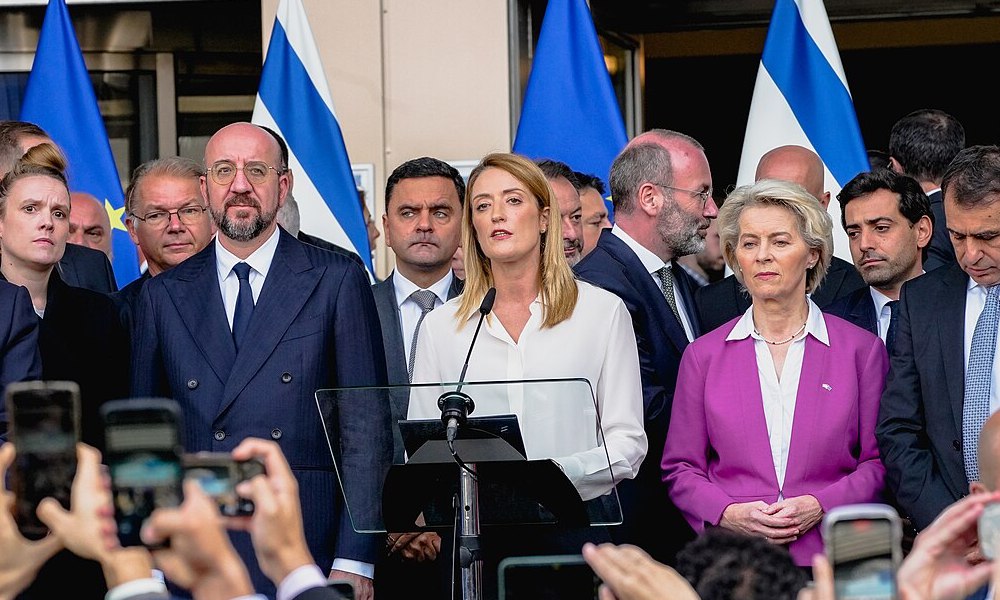
Last Friday, October 13, two of the most senior figures in European politics—European Commission President Ursula von der Leyen and European Parliament President Roberta Metsola—touched down in Israel for an unexpected visit. The pair visited Kibbutz Kfar Aza in the western Negev, where Hamas committed a brutal massacre on the morning of October 7, and met with Israeli president Isaac Herzog. “We are friends of Israel. When friends are under attack, we stand by them,” von der Leyen tweeted that day. “Israel has the right and duty to respond to Hamas’s act of war.”
Von der Leyen’s clear choice of words was representative of how many leaders from across Europe have swung behind Israel in the wake of Hamas’s devastating invasion. German foreign minister Annalena Baerbock was also in Israel on Friday meeting with her counterpart there, Eli Cohen. “A new era has begun,” she said. “It is important not to look away and to call terror by its name.” Addressing the French nation on Thursday, president Emmanuel Macron condemned Hamas’s “blind murderous hatred” and “absolute cruelty” and said Israel had the right to defend itself “by eliminating terrorist groups, including Hamas, with targeted actions.”
Yet Europe is not as united as it may seem. Von der Leyen is not Europe’s foreign minister—that would be Josep Borrell—and she was, to a certain extent, freelancing when she went to Israel last week by travelling there without first receiving a mandate from EU heads of government. Some European leaders were aggrieved that von der Leyen failed to mention Israel’s obligations to humanitarian and international law as it prepares to strike back against Hamas, and a joint statement from members of the European Council on the situation in Israel-Palestine published Sunday was more measured:
“We reiterate the importance to ensure the protection of all civilians at all times in line with International Humanitarian Law,” the statement read. Irish prime minister Leo Varadkar was representative of the oppositional strain of European opinion when he remarked last week that while Israelis had “a right to defend themselves, they don’t have the right to breach international humanitarian law. I’m really concerned about what I’m seeing happening in Gaza at the moment. To me, it amounts to collective punishment.” The rift lines in Europe, then, are there for all to see and may open up further.
On the ground in Europe, the Austrian Jewish filmmaker Ruth Beckermann articulated the kind of collective shock running through European Jewish reactions when she told the Austrian newsweekly Profil that Hamas’s invasion “was not a war, but rather a pogrom.” Writing in the same magazine, the Austrian Jewish novelist Doron Rabinovici said that Hamas’s actions “were not part of a legitimate struggle for freedom, nor were they a thoughtless excess. The aim from the beginning was to slaughter as many defenceless people as possible. It was about committing war crimes.”
The Austrian Jewish community is among those that have organized demonstrations in solidarity with Israel, remembrance of the murdered and support of the hostages. Around 3,000 people including Austria’s chancellor and vice-chancellor showed up at these rallies in Vienna last week. The largest pro-Israel demonstration in Berlin attracted 2,000 people the day after Hamas’s invasion. Hundreds from London’s Jewish community attended a vigil outside the Houses of Parliament for Hamas’s victims, while in Brussels, the new civil action network DemoCrisis organized a rally urging European leaders to do something to bring back the hostages, some of whom hold dual citizenship in Germany, Austria and other European countries.
As night follows day, with conflict in Israel-Palestine comes terrorism and antisemitism in Europe. The most violent incident took place in France where 57-year-old Dominique Bernard was killed by a 20-year-old man of Chechen origin in the town of Arras, which has large Jewish and Muslim communities. Authorities linked the murder to a growing “atmosphere of jihadism,” in the words of French interior minister Gerald Darmanian, following Hamas’s invasion.
Jewish institutions across Europe have stepped up security since October 7. Last Friday, when Hamas called for a “day of rage” that Jewish communities feared could have a ripple effect, some Jewish schools in London and Amsterdam took the precaution of closing for the day. In Vienna, the Jewish community advised parents to walk their children to school and synagogue and not to linger in front of Jewish buildings. Rabinovici spoke to community concerns when he asked in Profil: “Has it come to the point where Jewish life has to go into hiding again?”
Those fears are, in part, linked to the eruption of pro-Palestinian demonstrations in European capitals. Thousands of pro-Palestinian demonstrators marched in London over the weekend, and several hundred pro-Palestinian protesters turned out in France, as well, despite a government ban on such protests. Journalists have reported hearing calls to violence such as “we sacrifice our soul and blood for Al-Aqsa” and “Khaybar, Khaybar, oh Jews, the army of Mohammed will return.” The latter, according to the Anti-Defamation League, “recalls a series of seventh-century battles between Mohammed and local Jews during the first few years of Islam’s establishment,” framing the Israeli-Palestinian conflict as a struggle between Judaism and Islam.
Access Moment’s ongoing coverage of the Hamas-Israel war here.
These solidarity rallies with Hamas can be explained, the Austrian sociologist Mouhanad Khorchide writes in the Austrian daily Der Standard, by a narrative that sees “Israel as the aggressor” and “Hamas [as] the defender of Islam’s holy sites,” thus making the issue one that goes to the heart of one’s religious identity. He notes that mainstream Arab broadcasters like Al Jazeera perpetuate this worldview. The Holocaust, which informs German and Austrian support for Israel in particular, does not have the same resonance in Muslim communities, Khorchide argues.
Der Standard reported Monday that Jews in Austria feel less secure in the aftermath of Hamas’s invasion. The Jewish Community of Vienna, which represents the cities Orthodox Jewish community, told Der Standard they don’t think there’s any reason to panic but that Jews “should take extra precautions.” Much the same advice could be given to Jews throughout Europe, where the brutality and inhumanity wrought by Hamas has heightened tensions and emotions. The fear is that the longer this conflict in Israel-Palestine goes on, and the larger and darker it gets, the greater the potential for the situation in Europe to escalate.
Top image: Roberta Metsola, President of the European Parliament (center); Ursula von der Leyen, President of the European Commission (right); Charles Michel, President of the European Council (left) and member of the European Parliament gathering in support of Israel in front of the European Parliament in Brussels. Photo credit: European Parliament (CC-BY-4.0).


